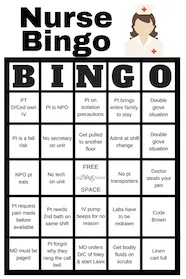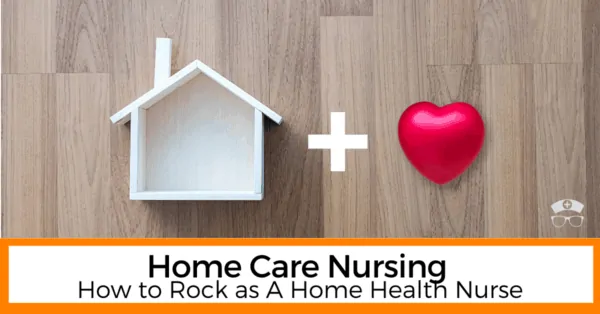Nursing is a fantastic career for a multitude of reasons. One of my favorites is the possibilities and flexibility available in the profession. There are so many pathways in nursing and thousands of things you can do with a nursing degree. There are nearly as many ways to get you there, in terms of education, certifications, and specializations. What is right in nursing for you may not be right for everyone.
While it is perfectly acceptable to practice as a nurse with an LPN or ADN nursing degree, there is much to be gained from furthering your formal nursing education. One of the primary benefits of higher education in an increase in salary. However, it should be noted that the salaries listed on this infographic will vary with the area of the country you live in and your years of experience as a nurse. I also think it’s relevant to mention that at the hospital I formerly nursed at, there was minimal difference in pay between an ADN and a BSN prepared nurse. There was, however, more opportunity for advancement within the organization with a BSN degree.
If you’ve decided you want to be a nurse, or you want to further your nursing education, the infographic below does a great job of displaying the paths one can take in pursuit of their nursing dreams.
What Pathway Have You Taken In Nursing?
Where are you at in your nursing education? Where do you want to be?
Download Nurse Bingo Today!

Liven up any shift with a fun game of bingo. See who can fill a row first!
Fill a whole card and lose grip with reality.
Your privacy is protected. We will never spam you.





I realize I’m reading this article several years after it was written but I was wondering if a combination of bachelor’s degree (in biology) and associates in nursing would be enough to apply for a masters in nursing. Any thoughts?
I think you have several options here.
You could get a master’s degree in another area that is close enough to nursing that most employers would honor it (Healthcare administration, public health, and so on).
You could pursue an ADN to MSN program. I would think that you would get credit for some of the BSN portion of the MSN program, but I am not 100% sure on this.
A friend of mine was actually in your situation (biology degree and everything) and she actually just went BSN and then MSN.
I’ve asked some other nurses to provide their feedback so perhaps they will have additional insight.
Each school has very unique requirements. Your situation is what bridge programs were created for, however, you should really contact the schools you are interested in applying to for specific requirements. A great place to check out school and their entry requirements is at Noodle.com. Then find a school that works for your situation. Good luck!!
More feedback for you:
Epsein LaRue, of http://www.epsteinlarue.com/, states “I have a bachelors in natural science education and an associates in nursing. Unfortunately, every college that I talk to wants me to go back and get my BSN before I can go for my MSN. There are bridge programs to do this with. I went to Excelsior College and did their Certificate of Grad-leve Management program. Now I’m traveling as a House Supervisor / Assistant Clinical Manager. it’s called something else now, but here is the link. http://www.excelsior.edu/programs/nursing/nursing-leadership-and-administration-of-health-care-systems-certificate”
Donna Wilk Cardillo, of http://donnacardillo.com/, states “There are MSN programs that would accept him. He may have to take a few extra courses but every school is different and they’re all looking for students. There are BSN/MSN combo programs, too. Advise him to start contacting the admissions counselor of some schools he’s interested in.”
Well done infographic! Remember, whatever type of nurse you become you will need scrubs! 🙂
If you work on the floor 🙂
I wish I could wear scrubs, but alas, in the IT world it is business casual.
Love this graphic!
I LOVE infographics when they are done well. This one does a great job of giving paths to nursing advancement.
Great post. (I stumbled upon your site somehow). I will be beginning a nursing program next fall, an ADN program. I have my bachelors in another field (anthropology). Due to financial reasons I’m getting my ADN. I’ve read on many forums that the job market is horrendous, and even worse for ADNs… so while I think that ADNs are just as qualified (we take the same test!), I’m wondering if I should pursue a BSN now… plus I want to have the option of APN later anyway.
Sort of, but not completely unrelated, do you have any info on what the job market is like for nurses? particularly ADNs?
I think your case is unique because you already have a BS, just no a BSN.
I would apply to both BSN and ADN programs. Typically the only difference in requirements is a few more core classes (which you usually don’t have to have completely finished before you start).
I don’t think there is a big difference in job prospects for ADN verses BSN prepared nurses. However, here is some food for though: If Susie nurse has an ADN and Nancy nurse has a BSN, and everything else about them is identical, who should get the job? so I guess that is the simple answer. A BSN could help you edge out the competition, but I really think in your case you can use your Anthropology degree and an ADN to totally outshine a fresh BSN grad.
There is much controversy and debate about the ADN and BSN debate. What I can tell you is that I enjoyed my BSN bridge program and I feel that it helped me make me a more well-rounded nurse. The concepts of leadership and evidence based practice that I learned have been invalauable. However, those are things that you often learn with years of experience.
Here’s another nurse blogger’s perspective on this topic: Nurse Ratched’s Place: Go Ask Mother: Advice About Going Back to School.
If you have the ability to apply at multiple schools, that would be what I would suggest and then go with your gut.
As a nurse you will rely heavily on that guy instinct, so you might as well start now!
Neat infographic. The whole ADN/BSN thing still drives me crazy. Having “just” an ADN hasn’t held me back one little bit from taking the nurse executive track. I have been a Director of Nursing for several years now, and my salary + benefits outpace every advanced practice nurse on the infographic, with the exception of CRNA. I appreciate the fact that you stated that ADNs and BSNs had no difference at the facility that you used to work for–that’s important for people to know, especially for those who can’t spend 4 years getting a BSN because they need to get into the workforce for economical reasons.
Love the infographic! There are so many difference directions one can go in to become a nurse and this helps clarify it for those starting out.